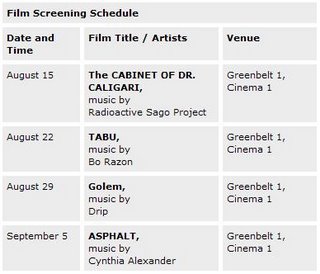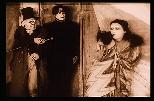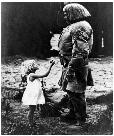3rd German Silent Film Festival
Film screenings: Aug 15 to Sep 5, 2006
Greenbelt 1, Cinema 1
(632) 8405723 to 24 / 8170978
goethepr@pldtdsl.net

One of the country’s most unique film festivals is back! Watch four different bands each take on the task of scoring a German silent film live. This year’s series gives audiences a little horror, some suspense, and even a love story. To be screened are “The Cabinet of Dr. Caligari”, “Asphalt”, “The Golem” and “Tabu”. The 1919 film “The Cabinet of Dr. Caligari”, directed by Robert Wiene, is a horror classic and landmark of German expressionism in cinema. It is also widely considered one of the most influential silent films ever made, since traces of the film can be seen in the likes of later masterpieces such as “Metropolis”, “Nosferatu”, “Faust”, and “Dr. Mabuse, the Gambler” among others. Wiene’s opus showcases a nightmare realm in which light, shadow and substance are abstracted, a world in which a demented doctor and a carnival sleepwalker perpetuate a series of murders in a small community. Complementing the strange world of Dr. Caligari will be the unique score done by avant-garde group Radioactive Sago Project .
The 1919 film “The Cabinet of Dr. Caligari”, directed by Robert Wiene, is a horror classic and landmark of German expressionism in cinema. It is also widely considered one of the most influential silent films ever made, since traces of the film can be seen in the likes of later masterpieces such as “Metropolis”, “Nosferatu”, “Faust”, and “Dr. Mabuse, the Gambler” among others. Wiene’s opus showcases a nightmare realm in which light, shadow and substance are abstracted, a world in which a demented doctor and a carnival sleepwalker perpetuate a series of murders in a small community. Complementing the strange world of Dr. Caligari will be the unique score done by avant-garde group Radioactive Sago Project . "The Golem”, subtitled “How He Came Into the World”, is director Paul Wegener’s third and most ambitious film on the golem, a popular figure in Jewish folklore. In the film, Rabbi Loew creates a golem to protect the residents of 16th Century Prague’s Jewish Ghetto from being expelled from the city. The Golem saves the Jews from expulsion, but the lumbering creature is not easily controlled and when he runs loose, the whole of Prague is in danger of destruction. The live music score for "The Golem" will be provided by Drip .
"The Golem”, subtitled “How He Came Into the World”, is director Paul Wegener’s third and most ambitious film on the golem, a popular figure in Jewish folklore. In the film, Rabbi Loew creates a golem to protect the residents of 16th Century Prague’s Jewish Ghetto from being expelled from the city. The Golem saves the Jews from expulsion, but the lumbering creature is not easily controlled and when he runs loose, the whole of Prague is in danger of destruction. The live music score for "The Golem" will be provided by Drip . Director Joe May is mostly known as the man who helped start Fritz Lang’s film career. His 1929 film “Asphalt”, a love story set in Berlin in the late 1920’s, is considered one of the last great German Expressionist films of the silent era. Starring the delectable Betty Amann in her most famous leading role (as a thieving femme fatale), Asphalt is a luxuriously produced classic where tragic liaisons and fatal encounters are shaped alongside the constant roar of traffic. Cynthia Alexander will be providing the score.
Director Joe May is mostly known as the man who helped start Fritz Lang’s film career. His 1929 film “Asphalt”, a love story set in Berlin in the late 1920’s, is considered one of the last great German Expressionist films of the silent era. Starring the delectable Betty Amann in her most famous leading role (as a thieving femme fatale), Asphalt is a luxuriously produced classic where tragic liaisons and fatal encounters are shaped alongside the constant roar of traffic. Cynthia Alexander will be providing the score. “Tabu”, to be scored by Bo Razon, was director F.W. Murnau’s last film. The director died tragically just seven days before its premiere in 1931. Filmed entirely in Tahiti, “Tabu” represented an unusual collaboration between legendary directors F. W. Murnau and Robert Flaherty (Nanook of the North). Two lovers are doomed by a tribal edict decreeing that the girl is "tabu" to all men. While the lovers' flight from judgement and the ultimate power of the tabu are reminiscent of Murnau's expressionist films, the film is all open air and sunlight. “Tabu” was the 1931 Academy Award winner for Best Cinematography.
“Tabu”, to be scored by Bo Razon, was director F.W. Murnau’s last film. The director died tragically just seven days before its premiere in 1931. Filmed entirely in Tahiti, “Tabu” represented an unusual collaboration between legendary directors F. W. Murnau and Robert Flaherty (Nanook of the North). Two lovers are doomed by a tribal edict decreeing that the girl is "tabu" to all men. While the lovers' flight from judgement and the ultimate power of the tabu are reminiscent of Murnau's expressionist films, the film is all open air and sunlight. “Tabu” was the 1931 Academy Award winner for Best Cinematography.
Each film will be accompanied by a live musical score by one of the country’s best groups.
The 3rd German Silent Film Festival is brought to you by Ayala Malls Cinema, Greenbelt, Globe and Carepark Moving & Storage.
All screenings are at 8 pm. You will need to buy tickets at Greenbelt 1 to enter.




No hay comentarios:
Publicar un comentario